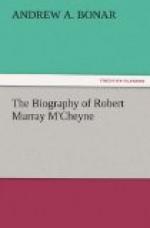The parish to which he had come was very large, containing six thousand souls. The parish church is at Larbert; but through the exertions of Mr. Bonar, many years ago, a second church was erected for the people of Dunipace. Mr. Hanna, afterwards minister of Skirling, had preceded M’Cheyne in the duties of assistant in his field of labor; and Mr. M’Cheyne now entered on it with a fully devoted and zealous heart, although in a weak state of health. As assistant, it was his part to preach every alternate Sabbath at Larbert and Dunipace, and during the week to visit among the population of both these districts, according as he felt himself enabled in body and soul. There was a marked difference between the two districts in their general features of character; but equal labor was bestowed on both by the minister and his assistant; and often did their prayer ascend that the windows of heaven might be opened over the two sanctuaries. Souls have been saved there. Often, however, did the faithful pastor mingle his tears with those of his younger fellow-soldier, complaining, “Lord, who hath believed our report?” There was much sowing in faith; nor was this sowing abandoned even when the returns seemed most inadequate.
Mr. M’Cheyne had great delight in remembering that Larbert was one of the places where, in other days, that holy man of God, Robert Bruce, had labored and prayed. Writing at an after period from the Holy Land, he expressed the wish, “May the Spirit be poured upon Larbert as in Bruce’s days.” But more than all associations, the souls of the people, whose salvation he longed for, were ever present to his mind. A letter to Mr. Bonar, in 1837, from Dundee, shows us his yearnings over them. “What an interest I feel in Larbert and Dunipace! It is like the land of my birth. Will the Sun of Righteousness ever rise upon it, making its hills and valleys bright with the light of the knowledge of Jesus?”
No sooner was he settled in his chamber here, than he commenced his work. With him, the commencement of all labor invariably consisted in the preparation of his own soul. The forerunner of each day’s visitations was a calm season of private devotion during morning hours. The walls of his chamber were witnesses of his prayerfulness,—I believe of his tears as well as of his cries. The pleasant sound of psalms often issued from his room at an early hour. Then followed the reading of the word for his own sanctification; and few have so fully realized the blessing of the first Psalm. His leaf did not wither, for his roots were in the waters. It was here, too, that he began to study so closely the works of Jonathan Edwards,—reckoning them a mine to be wrought, and if wrought, sure to repay the toil. Along with this author, the Letters of Samuel Rutherford were often in his hand. Books of general knowledge he occasionally perused; but now it was done with the steady purpose of finding in them some illustration of spiritual truth. He rose from reading Insect Architecture, with the observation, “God reigns in a community of ants and ichneumons, as visibly as among living men or mighty seraphim!”




